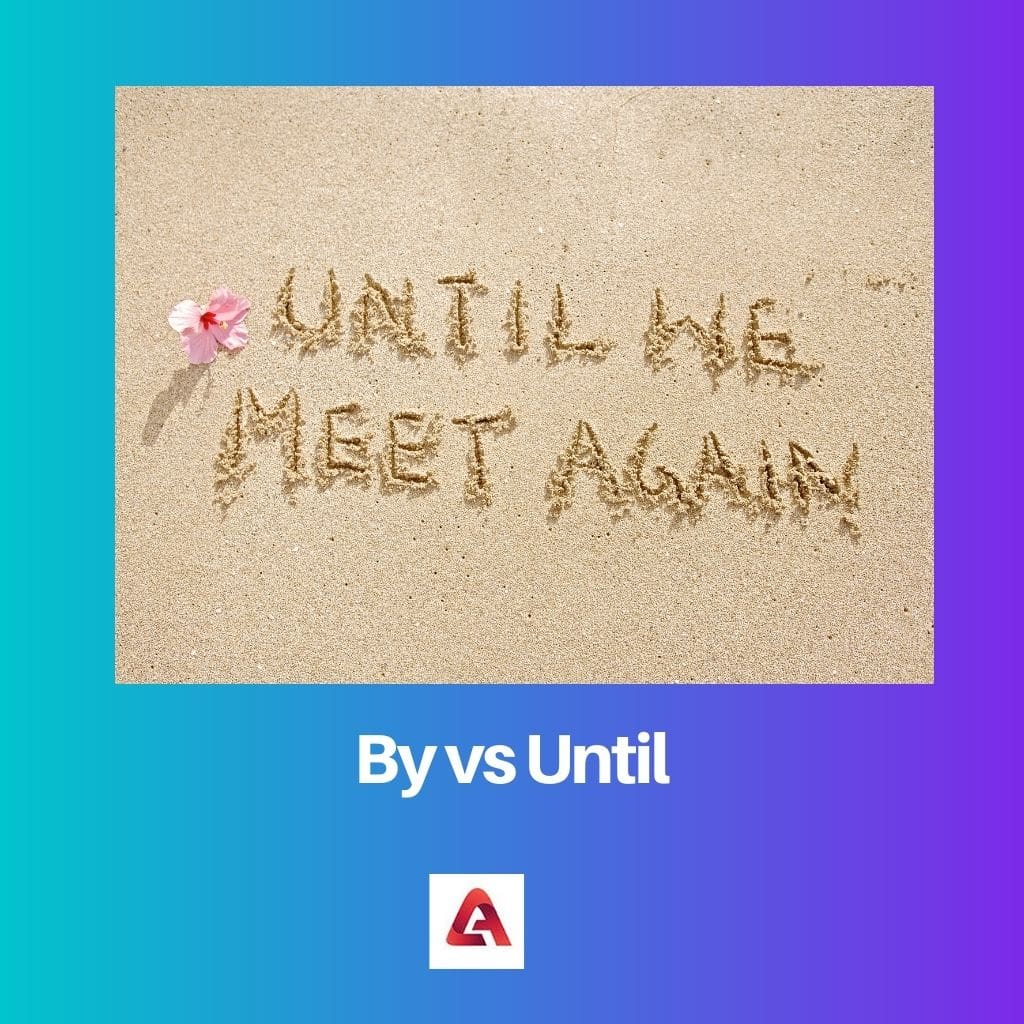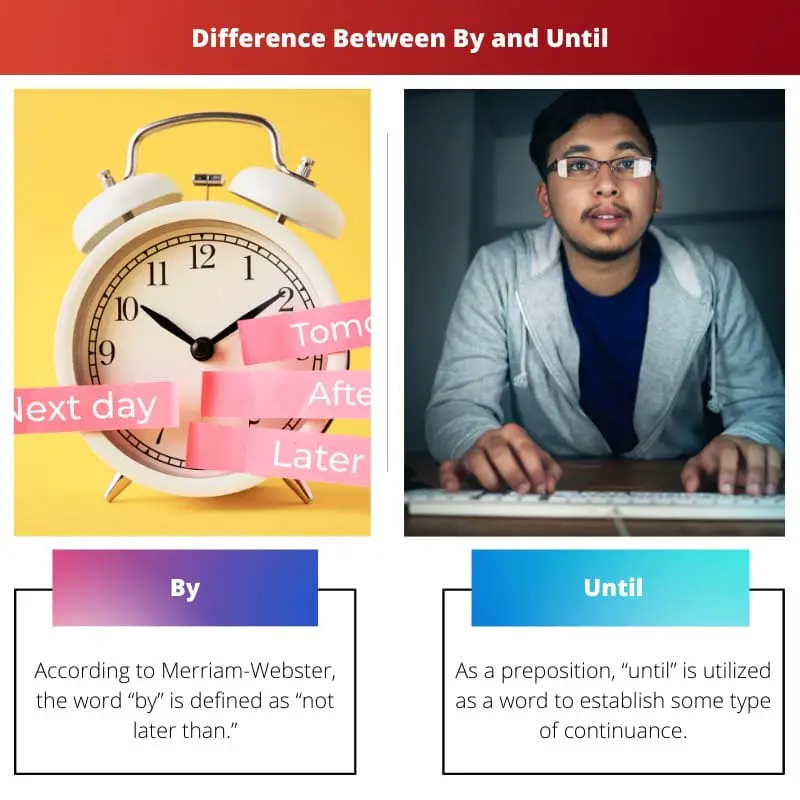“By” implies completion or accomplishment by a specified time, whereas “until” suggests an ongoing state or action continuing up to a particular point in time.
Key Takeaways
- “By” indicates a deadline or the end of a period in which an action should be completed, while “until” denotes the duration or continuation of a step up to a specific point in time.
- Using “by” in a sentence implies an action will be finished before or at a specified time, while using “until” suggests the movement will continue and then stop at that time.
- These words can create ambiguity if used interchangeably, describing different relationships between actions and time.
By vs Until
By is used when referring to ending or accomplishing something before a particular time or deadline. Until tell about the time span or duration leading up to a certain specific point or event.

Comparison Table
| Aspect | “By” | “Until” |
|---|---|---|
| Definition | “By” indicates a point in time before, at, or no later than a specified time or deadline. It means something should be completed or accomplished by the mentioned time. | “Until” indicates a point in time up to a specified time or deadline, with the implication that something will continue or last until that time. |
| Time Reference | Refers to a specific point or moment in time when an action or event should be completed. | Refers to a time frame that extends from the present or some starting point up to a specified end point in time. |
| Examples | – “Please submit your report by Friday.” (The report should be submitted on or before Friday.)<br>- “I will finish my work by 5 PM.” (Work should be completed before 5 PM.) | – “The store is open until 9 PM.” (The store remains open up to 9 PM.)<br>- “You can borrow the book until next week.” (You can keep the book until the following week.) |
| Time Inclusion | “By” includes the specified time or deadline as part of the allowable time frame. | “Until” does not include the specified time or deadline as part of the allowable time frame; it ends just before that point. |
| Future Tense | Often used in future tense sentences to indicate a future point in time when something should be completed. | Often used in present or future tense sentences to indicate an ongoing or continuous state or action up to a future point in time. |
| Examples (Future) | – “I will finish the project by Monday.” (Project completion is expected on or before Monday.)<br>- “They need to decide by the end of the week.” (The decision should be made on or before the week’s end.) | – “The party will continue until midnight.” (The party will last until just before midnight.)<br>- “She will work until 5 PM.” (Her work will continue up to 5 PM.) |
What is “by” and When to use “by”?
“By” is a preposition that is commonly used to indicate a point in time before, at, or no later than a specified time or deadline. It is used to express when a particular action, task, or event should be completed or accomplished. “By” is versatile and can be used in various contexts to establish time frames or deadlines.
Here are some common uses of “by” and when to use it:
- Deadline or Time Frame: “By” is used to set a deadline or time frame for completing a specific task or action.
- “Please submit your report by Friday.” (The report should be submitted on or before Friday.)
- “I need the project completed by the end of the month.”
- Future Actions: “By” is used to indicate when a future action or event will take place or be completed.
- “I will finish my work by 5 PM.” (Work should be completed before 5 PM.)
- “We should arrive at the airport by 7 AM for our flight.”
- Promises and Commitments: It is used to make promises or commitments regarding the timing of an action.
- “I promise to call you by tomorrow afternoon.”
- “I’ll have the repairs done by next week.”
- Time Constraints: “By” can be used to describe a condition or limitation related to time.
- “We can schedule the meeting by appointment only.”
- “The discount offer is valid by the end of the month.”
- Order and Sequence: In the context of a sequence or order of events, “by” can indicate a step or action to be completed before proceeding to the next.
- “Please finish this section by the time we have our next team meeting.”
- “Complete the first three chapters by the end of the week, and then we’ll move on to the next ones.”

What is “Until”?
“Until” is a preposition and conjunction used to indicate a point in time up to a specified time or deadline. It suggests that something will continue or last until that particular time or event is reached. “Until” is used to establish a temporal boundary or to describe the duration of an action or state. Here’s when and how to use “until”:
- Temporal Boundaries: “Until” is commonly used to set a boundary in time, indicating when an action or event begins and ends.
- “The store is open until 9 PM.” (The store remains open up to 9 PM.)
- “You can borrow the book until next week.” (You can keep the book up to the following week.)
- Duration: It is used to describe how long an action or state continues without interruption.
- “They danced until dawn.” (They continued dancing without stopping until the arrival of dawn.)
- “I’ll be on vacation until the end of the month.” (The vacation will last up to the end of the month.)
- Continuation: “Until” can express that something persists or continues up to a certain point.
- “Please wait here until I return.” (Wait here, and I will return at some point in the future.)
- “The meeting will continue until everyone’s questions have been answered.”
- Future Reference: It is used in present or future tense sentences to indicate an ongoing or continuous state or action up to a future point in time.
- “She will work until 5 PM.” (Her work will continue until 5 PM.)
- “We won’t leave until they arrive.” (We will wait for their arrival before leaving.)
- Negation: In some cases, “until” is used in a negative context to indicate that something will not happen or continue up to a certain point.
- “We won’t stop working until the project is complete.” (The work will continue without stopping until the project is finished.)
- Conditional Statements: “Until” can be used in conditional statements to express a condition that must be met before something happens.
- “I won’t sign the contract until I review all the terms and conditions.” (The signing of the contract depends on the completion of the review.)
- Comparisons: It is used in comparisons to highlight differences in timing or duration.
- “I can’t believe she waited until the last minute to start her homework.” (She started her homework very close to the deadline.)

Main Differences Between “By” and “Until”
- Meaning:
- By: “By” indicates a point before, at, or no later than a specified time or deadline. It signifies that something should be completed or accomplished by the mentioned time.
- Until: “Until” indicates a point in time up to a specified time or deadline, implying that something will continue or last until that time.
- Time Reference:
- By: “By” refers to a specific point or moment when an action or event should be completed. It is a point-in-time reference.
- Until: “Until” refers to a time frame that extends from the present or some starting point up to a specified end point. It is a duration of time reference.
- Time Inclusion:
- By: “By” includes the specified time or deadline as part of the allowable time frame.
- Until: “Until” does not include the specified time or deadline as part of the allowable time frame; it ends just before that point.
- Future Tense:
- By: “By” is used in future tense sentences to indicate a future point in time when something should be completed.
- Until: “Until” is used in present or future tense sentences to indicate an ongoing or continuous state or action up to a future point in time.
- Examples (Future):
- By: “I will finish the project by Monday.” (Project completion is expected on or before Monday.)
- Until: “The party will continue until midnight.” (The party will last until just before midnight.)
- Examples (Negation):
- By: “We need to finish the report by Friday, or we’ll miss the deadline.” (Completion should happen on or before Friday.)
- Until: “We won’t leave the park until the rain stops.” (We’ll wait for the rain to stop before leaving.)
- Use Cases:
- By: “By” is used when you specify a point by which something should be done or achieved. It sets a deadline or completion target.
- Until: “Until” is used when you want to describe the duration of an action, state, or continuation up to a particular time or event. It indicates when something stops or changes.

- https://dictionary.cambridge.org/dictionary/english/by
- https://www.merriam-webster.com/dictionary/until
- https://speakspeak.com/resources/english-grammar-rules/conjunctions/until

I appreciate the thorough comparison table. It’s easy to comprehend and makes the difference between ‘by’ and ‘until’ very clear.
Definitely! The comparison table simplifies the distinction between the two terms.
I found the detailed analysis of ‘by’ and ‘until’ very beneficial. It will certainly enhance my usage of these terms in future.
I find the examples provided for both ‘by’ and ‘until’ to be extremely helpful. The article is quite comprehensive.
This explanation is very helpful and informative. It’s good to have a clear distinction between ‘by’ and ‘until’.
I agree! The examples provided really help to understand the differences between the two.
The article is a valuable elucidation of ‘by’ and ‘until’. The distinctions highlighted are crucial for effective communication.
The article could have delved into more real-life scenarios to showcase the application of ‘by’ and ‘until’. It would have added a practical dimension to the comparison.
While the article does clarify the differences between ‘by’ and ‘until’, it feels a bit repetitive. Perhaps it could have been more concise.
The article is well-researched and articulately lays out the nuances between ‘by’ and ‘until’. It’s a great resource for anyone grappling with these terms.
Absolutely agree! The clarity in the explanations is commendable.
This explanation is quite comprehensive and leaves no room for confusion. Kudos to the author for the clarity.
This article is quite enlightening. I have always been confused about when to use ‘by’ or ‘until’. This has cleared it up for me.